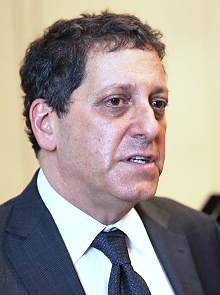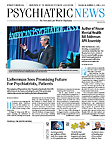The long era of nonreproducible findings in the genetics of mental illness is over—or should be, said Matthew State, M.D., Ph.D., a professor and chair of psychiatry at the University of California, San Francisco, in a lecture at APA’s 2014 annual meeting in New York in May.
The use of the candidate-gene approach produced results that were difficult, if not impossible, to be duplicated by other labs and led to “genetics fatigue,” said State. However, a shift to genomewide association studies (GWAS) led to significant—and replicated—discoveries over the last decade.
In addition to the GWAS approach, larger sample sizes and advances in high-throughput screening technology have offered novel insights into pathophysiology, he said. The most recent study from the Psychiatric Genetics Consortium (consisting of 60 groups in 17 countries) reported on the sequencing of 21,000 individuals.
Costs are now lower, too. Sequencing a complete human genome cost $3 million in 1998, compared with $550 today.
By one standard, at least, genetics is easy, said State. After all, there are 100 billion neurons and 100 trillion synapses in the brain, but a mere 3 billion base pairs in the human genome.
“We’re looking not for a gene but for differences in the sequences or structure of the DNA that changes the instructions on how a protein is created, operates, or regulates,” he said.
Genetic understanding of autism and schizophrenia is the most advanced of all mental disorders at present, with bipolar disorder close behind, he noted. Advances have been slower in studies of depression and attention-deficit/hyperactivity disorder.
In autism, early successes came with monogenic syndromes like Fragile X, but recent progress has come from gene variants with small effects. Studies of submicroscopic chromosome structure and de novo copy-number variations in autism, for instance, have led to well-replicated identification of 10 genes, most involved in chromatin modification and the regulation of gene expression. A forthcoming paper will add another 25 genes to that list, he said.
If rare de novo variations appear to produce larger effects in autism, discoveries so far in schizophrenia seem to show more numerous common variations, each with small effects. Perhaps 6,000 to 10,000 single nucleotide polymorphisms contribute to schizophrenia risk, but odds ratios rarely exceed 1.2—“tiny increments overall,” he explained.
Another key finding is the significant overlap in de novo gene mutations across several diagnostic categories, including schizophrenia, autism spectrum disorder, major depression, epilepsy, intellectual disability, and bipolar disorder.
“Genes haven’t read any version of the DSM,” said State. “The same variation can lead to classic autism in one person or classic schizophrenia in another, and this is exploding our notion that genes equal diagnosis.”
Discovery of a gene variant isn’t enough, State pointed out. Researchers have to know in which cells, in which brain region, in combination with which other genes, and at what time during development it is turned on or off. Autism gene variants discovered so far appear to operate during mid-fetal development, not an easy time for intervention, he noted.
“The challenges are new, but the field is moving quickly to meet them,” State said. “This bottom-up approach offers a way to build from the genome through neurons and the brain, to complex behavior in a way that will lead to a new fundamental understanding of psychiatric disorders.” ■

